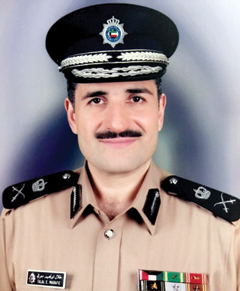 Major General Talal Maarafi
Major General Talal MaarafiKUWAIT: Director General of Residency Affairs Maj Gen Talal Maarafi said the most important reasons that made the interior ministry submit a proposal to increase fees is the deficit in the state’s general budget, besides the real cost of services presented by the department, which are not in harmony with the current fees.
He said the current fees have been in effect for 40 years without a change and most of them are selective, such as for visit and temporary residency permits. “We are not against expats as they are our brothers. They live in Kuwait and earn their living here, and have a major role in building old and modern Kuwait as far as education, health and infrastructure are concerned, but the fee increase includes both expats and citizens,” he told Al-Qabas daily.
Maarafi spoke about a new system to renew expats’ residency permits online, adding several offers from companies are being studied to select the best.
He said this project will improve performance and make it easy for companies, while boosting economic activity and reducing the number of people in offices. He revealed there will be a new security card instead of the sticker on the passport. He said new fees will not be implemented on visit and residency permits without the approval of Deputy Premier and Interior Minister Sheikh Khalid Al-Jarrah Al-Sabah and the National Assembly
. Maarafi said there are 2.753 million residents with valid residencies in the country, representing nearly 205 nationalities from around the world. He said Indians are on top with 925,000 residents, followed by 605,000 Egyptians, 257,000 Filipinos, 241,000 Bangladeshis, 144,000 Syrians, 107,000 Pakistanis and 93,000 Sri Lankans.
Maarafi said a new penalty for harboring iqama violators of KD 1,000 will have to be paid instantly if a joint committee of the interior, social affairs, municipality and commerce ministries catch an employer with a residency law violator working for him. He said that a meeting was held with the health and social affairs committee at the Assembly with regards to imposing health insurance on visitors.
He said visit visa holders are not allowed to work, especially those on business visas, adding that many such cases have been discovered and deported. About the decision to increase the salary ceiling of those who want to bring their wives, children or other relatives on visit visas, he said strict measures are being implemented to prevent marginal laborers, beggars and those seeking treatment from arriving in the country, by studying the cases and ability of the applicants.
He said parents’ visits are linked to age and the maximum age limit is 60. As for ages above this, the cases are considered according to status and salary.
Maarafi said the salary ceiling for family visas will be raised from KD 250 to KD 450, while recommendations are made to the manpower authority to decide the maximum period of residency. He said no family visas will be granted to children without the presence of the father. He said the mother cannot sponsor her children except for rare specialties the country needs.
Meanwhile, Social Affairs and Labor Minister and State Minister for Economic Affairs Hind Al-Sabeeh told Al-Rai daily a plan to deal with the population imbalance has been in place for a while, and coordination is ongoing with ministries and government departments to implement it, adding “the response of government departments was positive, and soon results will be clearer”.
She said the social affairs ministry is following the matter with government entities, which expressed strong belief that the imbalance exists and must be dealt with. Sabeeh said some departments have started to reduce the number of cleaning and security workers by 25 percent, adding other contracts must be waited out so to prevent any legal action.











